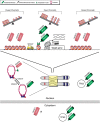The Mendelian disorders of the epigenetic machinery
- PMID: 26430157
- PMCID: PMC4579332
- DOI: 10.1101/gr.190629.115
The Mendelian disorders of the epigenetic machinery
Abstract
The Mendelian disorders of the epigenetic machinery are genetic disorders that involve disruption of the various components of the epigenetic machinery (writers, erasers, readers, and remodelers) and are thus expected to have widespread downstream epigenetic consequences. Studying this group may offer a unique opportunity to learn about the role of epigenetics in health and disease. Among these patients, neurological dysfunction and, in particular, intellectual disability appears to be a common phenotype; however, this is often seen in association with other more specific features in respective disorders. The specificity of some of the clinical features raises the question whether specific cell types are particularly sensitive to the loss of these factors. Most of these disorders demonstrate dosage sensitivity as loss of a single allele appears to be sufficient to cause the observed phenotypes. Although the pathogenic sequence is unknown for most of these disorders, there are several examples where disrupted expression of downstream target genes accounts for a substantial portion of the phenotype; hence, it may be useful to systematically map such disease-relevant target genes. Finally, two of these disorders (Rubinstein-Taybi and Kabuki syndromes) have shown post-natal rescue of markers of the neurological dysfunction with drugs that lead to histone deacetylase inhibition, indicating that some of these disorders may be treatable causes of intellectual disability.
© 2015 Bjornsson; Published by Cold Spring Harbor Laboratory Press.
Figures



References
-
- Alarcón JM, Malleret G, Touzani K, Vronskaya S, Ishii S, Kandel ER, Barco A. 2004. Chromatin acetylation, memory, and LTP are impaired in CBP+/− mice: a model for the cognitive deficit in Rubinstein-Taybi syndrome and its amelioration. Neuron 42: 947–959. - PubMed
-
- Almuriekhi M, Shintani T, Fahiminiya S, Fujikawa A, Kuboyama K, Takeuchi Y, Nawaz Z, Nadaf J, Kamel H, Kitam AK, et al. 2015. Loss-of-function mutation in APC2 causes Sotos syndrome features. Cell Rep 10: 1585–1589. - PubMed
-
- Balemans MC, Ansar M, Oudakker AR, van Caam AP, Bakker B, Vitters EL, van der Kraan PM, de Bruijn DR, Janssen SM, Kuipers AJ, et al. 2014. Reduced euchromatin histone methyltransferase 1 causes developmental delay, hypotonia, and cranial abnormalities associated with increased bone gene expression in Kleefstra syndrome mice. Dev Biol 386: 395–407. - PubMed
Publication types
MeSH terms
Grants and funding
LinkOut - more resources
Full Text Sources
Other Literature Sources
